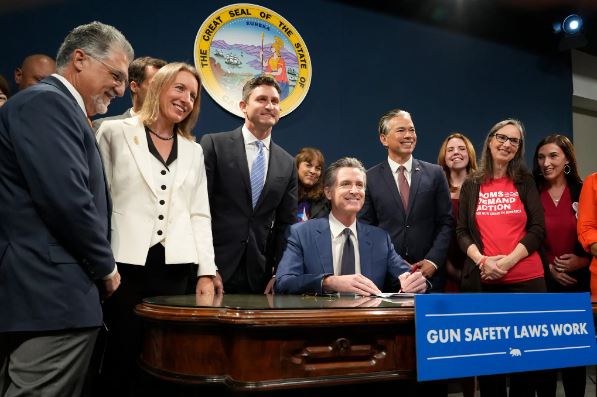In a recent development, a federal appeals court has given the green light for California’s ban on carrying firearms in most public places to take effect in 2024. This decision overturns a previous ruling by U.S. District Court Judge Cormac Carney, who had blocked the enforcement of the law, stating that it would unconstitutionally infringe on citizens’ Second Amendment rights. The state law, known as Senate Bill 2, imposes various restrictions on gun ownership and was approved by Governor Gavin Newsom in September. The appeals court’s decision, while temporarily allowing the law to be implemented, sets the stage for further deliberation on its constitutionality.
Senate Bill 2 encompasses several measures aimed at regulating gun ownership in California. Among its provisions is a ban on carrying firearms in most public places, which is categorized into 26 different types of locations, including playgrounds, public transportation, stadiums, amusement parks, and museums. The law also establishes the minimum age for obtaining a gun license at 21 and introduces additional requirements for gun safety training before obtaining a new license. Additionally, individuals are prohibited from carrying firearms on the premises of private businesses unless clear signage indicates otherwise.
The legal saga began when Judge Carney, in December, issued an injunction to block the enforcement of Senate Bill 2, deeming the ban on guns in most public places as an affront to the Second Amendment. He characterized the law as “sweeping” and “repugnant” while openly defying the Supreme Court. However, the Ninth Circuit Court of Appeals intervened, temporarily pausing the injunction and allowing the law to go into effect on Monday. The court will take additional time to thoroughly assess the constitutionality of Senate Bill 2.
Governor Newsom, a Democrat, welcomed the appeals court’s decision, emphasizing that it ensures the preservation of “common-sense gun laws” while the state appeals the district court’s ruling. State Senator Anthony Portantino, the author of the bill, expressed cautious optimism about the law withstanding legal challenges, asserting that it is in the best interest of public safety.
Despite the positive response from California’s Democratic leaders, the law faces resistance from concealed carry permit holders and various gun-rights organizations, including the California Rifle & Pistol Association, the Second Amendment Foundation, and the Gun Owners Foundation. These groups filed a legal challenge against the provisions that restrict carrying guns in specific public places.
C.D. Michel, the general counsel for the California Rifle & Pistol Association, pointed out that the appeals court’s decision is not a definitive victory for the state, as the court still needs to pass judgment on the merits of the case. Michel argued that for decades, individuals with a license to carry in public have been permitted to do so in various places. He also characterized the state law as an attempt to circumvent a recent U.S. Supreme Court ruling that struck down a New York law severely limiting the carrying of guns outside homes.
The legal battle over Senate Bill 2 highlights broader debates around gun control and the interpretation of the Second Amendment. While Democrats and proponents of the law argue that restricting firearms in sensitive public places enhances public safety, opponents contend that such measures infringe on individuals’ constitutional rights. The legal landscape surrounding gun regulations is complex and varies across states, with some, like New York and Illinois, implementing additional restrictions in response to recent incidents of gun violence.
the recent appeals court decision marks a significant development in the ongoing legal debate over California’s gun regulations. As the court takes more time to assess the constitutionality of Senate Bill 2, the outcome will have far-reaching implications for gun control measures in the state and may contribute to the broader national conversation on Second Amendment rights and public safety.

